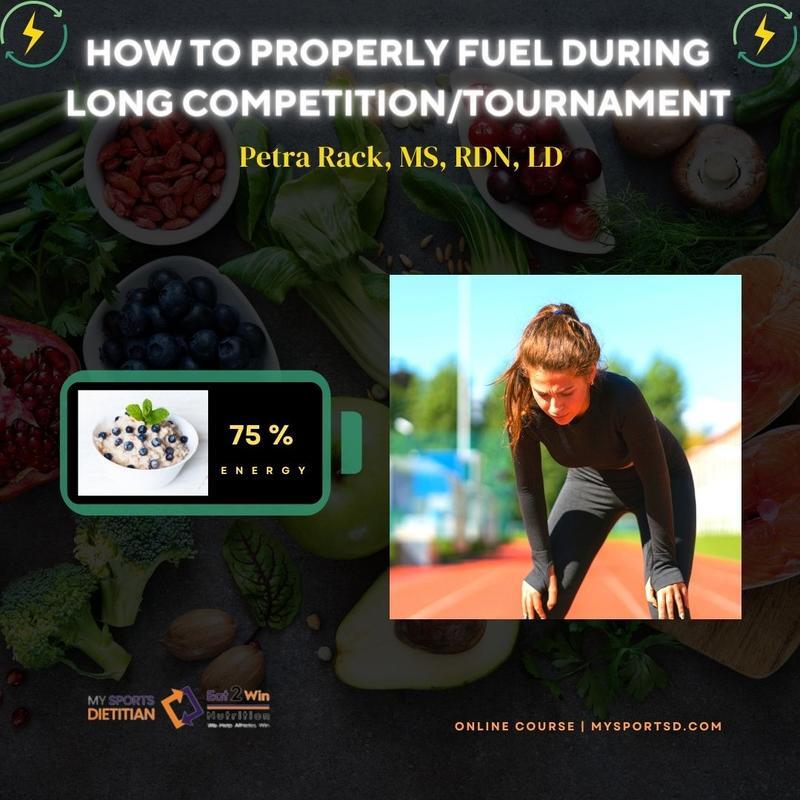
Ensure your athletes stay energized while traveling and competing with effective nutrition and hydration plans. Learn how to prioritize fueling before, during, and after long competitions to meet high energy needs and maximize performance.
Long competitions and multi-day tournaments place unique, demanding stresses on an athlete's body. Unlike single games, athletes must recover quickly and often travel, making consistent, quality nutrition a challenge. Staying fueled and hydrated is not just about avoiding "hitting the wall"—it’s about maintaining cognitive function, reducing injury risk, and ensuring peak performance through the final whistle.
This guide provides a structured, actionable nutrition and hydration plan to help your athletes dominate from the first event to the last.
The Foundation: Pre-Tournament & Travel Fueling
Effective tournament nutrition starts days before the first match, especially during travel. Consistency is key; stick to familiar foods to avoid an upset stomach.
Prioritizing Nutrition During Travel
Travel—especially long-distance travel—can disrupt eating habits and hydration levels. Proactive planning is essential.
Pack Smart Snacks: Don't rely on airport or gas station fare. Pack a cooler with nutrient-dense, shelf-stable options like:
Whole-grain crackers and nut butter packets.
Trail mix (nuts and dried fruit).
Portable fruits (bananas, apples, oranges).
Protein bars (check sugar and fiber content).
Hydrate Relentlessly: Airplane air and long car rides are dehydrating. Encourage athletes to carry a reusable water bottle and sip consistently. Water is the priority, but a small amount of diluted sports drink can help replenish electrolytes on extremely long travel days.
Seek Balanced Meals: When eating out, aim for balanced plates: 2/3 Carbohydrates (rice, pasta, potato, whole grains) for energy and 1/3 Lean Protein (chicken, fish, tofu) for muscle repair, plus plenty of fruits and vegetables. Avoid high-fat, fried, or overly spicy foods that can slow digestion.
The Day Before Carb-Loading Strategy
For endurance sports or those with multiple games, topping off glycogen (energy) stores is crucial.
Focus on Complex Carbs: Meals 24-48 hours before the tournament should be carbohydrate-rich but low in fat and moderate in fiber to ensure easy digestion. Think pasta with marinara sauce, rice bowls, or baked potatoes.
Maintain Hydration: Continue to drink 8-10 glasses of water.
Game Day Fueling: Timing is Everything
The day of the competition requires precise timing to maximize energy availability without causing gastrointestinal (GI) distress.
Pre-Competition Meal (3-4 Hours Out)
This meal is the final energy boost.
| Component | Goal | Example Foods |
| Carbohydrates | High (Primary energy source) | Oatmeal, whole-grain toast, bagels, rice. |
| Protein | Moderate (Satiety and muscle support) | Eggs, Greek yogurt, or a protein shake. |
| Fat & Fiber | Low (Avoid GI upset) | Limit high-fat dairy, fried foods, and large amounts of raw vegetables. |
| Hydration | 16-24 oz of water or a sports drink. |
Pre-Game Snack (30-60 Minutes Out)
A small, easily digestible snack for a quick energy top-off.
Simple Carbohydrates: Fruit (banana, orange slices), energy chews, applesauce pouches, or a small handful of pretzels.
Hydration: 8-12 oz of water.
Fueling & Hydrating During the Competition
This is where the most common fueling mistakes happen. Athletes need both quick energy and electrolyte replacement.
Mid-Competition Refueling (Every 45-60 Minutes)
The goal is to provide a steady supply of glucose to working muscles.
Quick Carbs: Aim for 30-60 grams of easily digestible carbohydrates per hour of continuous exercise.
Sports gels/chews
Fig bars
Orange or watermelon slices
Small bites of a granola bar
Sports drinks (which also contribute to hydration)
Essential Hydration & Electrolytes
Sweat depletes water and electrolytes (especially sodium). Ignoring this leads to cramps, fatigue, and poor performance.
Consistent Intake: Athletes should drink small amounts regularly (e.g., every 15-20 minutes).
Water for basic fluid replacement.
Sports Drinks for events over 60 minutes or in hot/humid conditions, as they provide both carbs and electrolytes. Look for drinks with a $6\%-8\%$ carbohydrate concentration.
Visual Check: Teach athletes to check their urine color—pale yellow is ideal. Dark yellow means they are behind on hydration.
The Three R's of Post-Game Recovery
Recovery starts immediately after the game, especially in a tournament setting with quick turnarounds. Focus on the "Three R's" within 30-60 minutes of finishing.
Refuel (Carbohydrates): Replenish muscle glycogen stores with fast-acting carbs.
Repair (Protein): Provide amino acids to repair muscle tissue damaged during competition.
Rehydrate (Fluids & Electrolytes): Replace all fluid and electrolyte losses.
Ideal Recovery Snacks:
Chocolate Milk: The classic recovery drink—contains the perfect carb-to-protein ratio.
Smoothie: Blend fruit (carbs) with Greek yogurt or protein powder (protein).
Turkey/Ham Sandwich on whole-grain bread.
Carb/Protein Bar with at least 15g protein.
Conclusion: Take Control of Your Nutrition Plan
Success in long tournaments is a blend of physical training, mental toughness, and most critically, a well-executed nutrition and hydration plan. By prioritizing proper fueling before travel, strategically timing game-day meals, and quickly initiating post-game recovery, your athletes can meet their high energy needs and sustain peak performance when it matters most.
